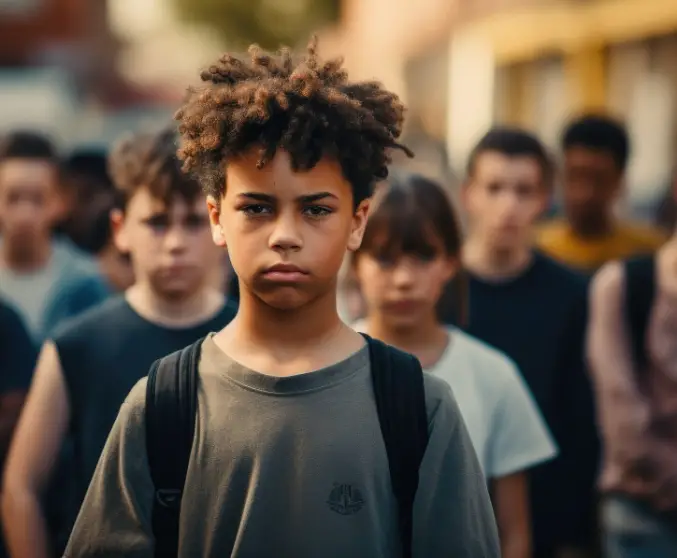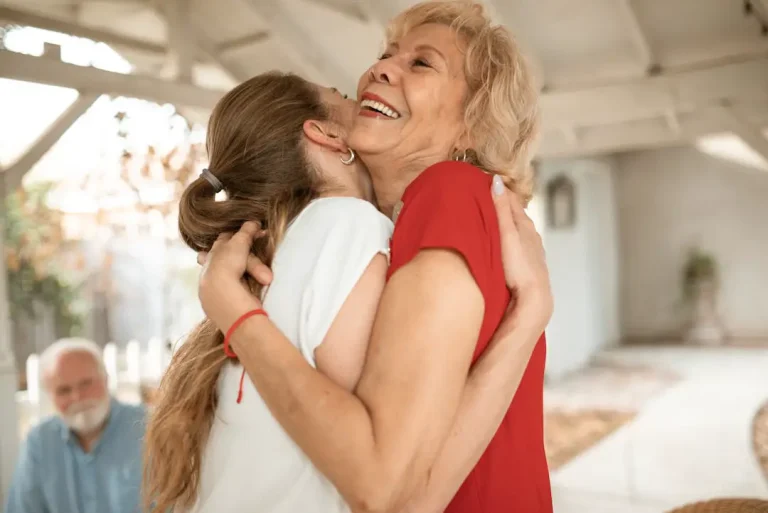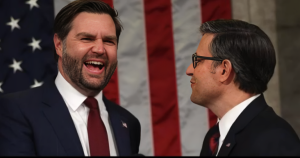The Motorcycle Gang That Saved a Bullied Teen: How 10 Veterans Changed One Boy’s Life Forever
A Powerful Story of Brotherhood, Courage, and Standing Up Against Injustice
“Why don’t you go back to where you came from, huh?” one of the boys sneered, his voice dripping with contempt and hatred.
It was Marcus Thompson’s first day at Oakridge High School in suburban Houston, Texas. The relentless Texas sun burned hot above the sprawling schoolyard, casting harsh shadows across the concrete, but the chill in the voices surrounding him made fourteen-year-old Marcus shiver despite the oppressive heat. He was new to this town, new to this school, desperately hoping for a fresh start—or so he had naively hoped just hours earlier.
But within the first few hours of his first day, he had become the primary target of a group that seemed to have been waiting for someone vulnerable to attack.
The Attack
A group of boys—blond, loud, arrogant, dressed in crisp designer uniforms that announced their privilege—had cornered Marcus by the main school gate. One aggressively shoved his shoulder with unnecessary force; another viciously kicked his backpack, deliberately spilling his carefully organized books across the dirty sidewalk.
“Can’t you even pick up your stuff, new kid?” one mocked with theatrical cruelty, playing to his audience of equally callous friends.
Marcus swallowed hard, the lump in his throat threatening to choke him as he bent down to gather his scattered belongings. “I don’t want any trouble,” he said quietly, hoping his submission would satisfy them and end this humiliation.
That plea only made them laugh louder, their cruel amusement echoing across the schoolyard.
The morning bus hissed away from the curb, leaving only the sound of jeering voices and the threatening slap of expensive sneakers against pavement. Marcus tried desperately to stand tall, to maintain some shred of dignity, but another brutal shove sent him sprawling onto the unforgiving concrete. His math textbook hit the ground with a dull, sickening thud that seemed to symbolize his collapsing hopes for a better life here.
“Pathetic,” said the ringleader, a boy named Tyler Morrison, smirking with practiced cruelty. “This isn’t your kind of school, understand? You don’t belong here.”
A few students nearby watched the scene unfold but didn’t move to help or intervene. Their silence and complicity stung Marcus more than the physical shove. He looked up from the ground, shame and humiliation burning behind his eyes—until a new sound rolled powerfully through the air.
The deep, rhythmic growl of motorcycle engines.
The Arrival
Ten motorcycles turned the corner in perfect formation, their chrome gleaming brilliantly in the midday sunlight. The bullies froze mid-laugh, their cruel amusement fading as the riders drew closer—men and women clad in black leather jackets, helmets shining, moving with the confidence of people who had seen real danger and weren’t impressed by schoolyard cowards.
They weren’t just random bikers passing through; their synchronized presence carried unmistakable weight and authority.
One of them—tall, broad-shouldered, his beard silver under the brilliant sun—revved his Harley Davidson and slowed deliberately near the scene. The group stopped strategically right in front of the school gate, their engines idling like thunder waiting to strike, a sound that commanded immediate respect and attention.
Marcus, still sprawled on the ground, looked up in amazement as the man killed his engine and lifted his visor with practiced ease.
“What’s going on here, boys?” the biker asked, his voice calm but carrying unmistakable command authority.
No one answered. Tyler’s confident grin faltered and disappeared.
“Just… just helping him up, sir,” Tyler stammered, his earlier arrogance evaporating.
“Doesn’t look like help to me,” the biker replied evenly. He turned to Marcus with genuine concern. “You okay, kid?”
Marcus nodded weakly, hardly believing what was happening.
Behind the lead biker, the others shut off their engines in unison—ten sets of heavy boots hit the pavement simultaneously.
The sound alone made every bully instinctively step back.
And that’s when Marcus noticed the patches on their jackets: Iron Brotherhood Veterans MC.
The kind of men and women who didn’t tolerate cowards or bullies under any circumstances.
That moment—surrounded by the powerful roar of engines, with his books scattered and his pride bruised but not broken—was the moment everything changed for Marcus Thompson.
Inside the Principal’s Office
The bikers escorted Marcus into the school administrative office, their commanding presence silencing the hallway whispers instantly. Students pressed against lockers, eyes wide with curiosity and fear, as this unprecedented group made their way through the corridors.
Principal Janet Larson blinked in genuine surprise when she saw the leather-clad group enter her office, clearly not her typical visitors.
“Can I help you gentlemen?” she asked carefully, trying to maintain her professional composure while obviously taken aback.
The lead biker introduced himself with respectful professionalism. “Name’s Cole Matthews, ma’am. We’re with the Iron Brotherhood—local veterans’ motorcycle club. We were passing by the school when we witnessed several of your students physically attacking this young man.”
Marcus stood beside Cole, eyes cast downward but shoulders straighter than they’d been in months.
The principal’s expression shifted from confusion to concern. “Physical bullying on school grounds?”
“More like an organized ambush,” Cole replied, his tone firm and factual. “We thought we’d make absolutely sure he got inside safely and that someone in authority knew what was happening out there.”
Within an hour, news of the incident had spread like wildfire across the entire campus. Tyler and his gang were called to the principal’s office individually and then together. Their rehearsed excuses stumbled and fell apart completely under questioning. When the school security footage was reviewed and confirmed everything the bikers had reported, the punishment was swift and severe—immediate suspension, mandatory counseling, and letters placed in their permanent records.
The Ride Home
After school ended that afternoon, Marcus found the bikers waiting patiently near the gate, their motorcycles lined up impressively. Cole approached with a spare helmet in hand.
“Hop on, kid. We’ll take you home,” Cole said with an encouraging half-smile.
Marcus hesitated, anxiety creeping back in. “I don’t think my mom would—”
“We already called her,” Cole interrupted gently. “She’s meeting us there. She knows you’re safe.”
That ride home changed Marcus’s entire world in ways he couldn’t yet comprehend. The wind hit his face as the engines roared down the highway—a strange, intoxicating mix of freedom and belonging he’d never experienced. The convoy of motorcycles moved together with practiced precision, and for the first time in months, Marcus felt genuinely protected.
When they arrived at the modest duplex where Marcus lived with his mother, Denise Thompson ran out, initial panic turning to tears of profound relief. She hugged Marcus tightly, checking him for injuries before turning to face Cole with gratitude and wariness.
“You found him?” she asked, her voice breaking.
Cole nodded respectfully. “Just in time, ma’am.”
Over coffee in the small kitchen, Denise explained through tears that her late husband, Marcus Sr., had also been a soldier—an Army sergeant who had served two tours in Iraq before dying in a training accident three years ago. She’d moved to this town hoping for a fresh start, but money was tight, and adjusting had been harder than she’d anticipated.
Cole’s weathered eyes softened with understanding and shared pain. “Then your boy’s got more strength in him than he knows, ma’am. He comes from good stock.”
Building Brotherhood
That evening, several of the bikers stayed for an impromptu dinner—burgers and stories filling a house that hadn’t known much of either lately. Marcus learned that every single biker present was a military veteran who’d seen incredibly hard times and come out stronger on the other side.
They told him stories—not primarily of war and combat, but of endurance, brotherhood, loyalty, and standing up for others when it would have been easier to walk away. They spoke of the battles after coming home, the struggles with civilian life, and how they’d found purpose again through helping others.
Cole looked Marcus directly in the eye before leaving that night. “Next time they push you down—and there might be a next time—don’t just stand up. Stand tall. You’ve got people in your corner now, son. Real people who won’t let you face it alone.”
Marcus felt something shift inside him—a spark of hope he’d thought was extinguished.
The Transformation
Weeks passed, and Marcus’s reputation at school underwent a dramatic transformation. The bullies, once feared and untouchable, now avoided him completely. Not because Marcus had fought back with fists or threats—but because people now saw him differently.
Word had spread about the bikers, about what had happened, about the veterans who’d stood up for a kid they didn’t even know. Teachers began praising Marcus’s courage in speaking up about what had happened. Classmates who had previously ignored him began sitting with him at lunch, asking questions, showing genuine interest.
Cole and the Iron Brotherhood checked in regularly, becoming a consistent presence in Marcus’s life. They helped him fix up an old rusty BMX bike they found at a garage sale, teaching him about maintenance, responsibility, and taking pride in your work. They invited him to local charity rides where the club raised money for homeless veterans and children’s hospitals.
The boy who had been violently pushed to the ground was now riding alongside a convoy that filled the streets with thunder and purpose.
Ride for Respect
One Saturday morning in late spring, the Iron Brotherhood hosted a major community event they called “Ride for Respect.” It was designed to raise awareness about bullying and to honor both military veterans and young people who’d shown courage in difficult circumstances.
Marcus stood on a small wooden stage beside Cole, looking out at hundreds of motorcycles lined up under the bright Texas sun, their chrome and paint gleaming. Veterans, families, students, and community members had gathered—easily over 500 people.
Cole spoke first, his voice carrying across the crowd through the sound system. “This ride today isn’t just for veterans, though we’re honored to lead it. It’s for every kid who’s ever been made to feel small, worthless, or afraid. You don’t fight hate with more hate—you fight it with strength, with unity, with standing together.”
When it was Marcus’s turn to speak, he took the microphone with hands that trembled slightly but with a voice that grew stronger with each word. “The day I met these men and women,” he said, nodding to the bikers standing proudly behind him, “I thought they looked scary. I thought they might be dangerous. But they showed me something my bullies never understood—real strength isn’t about hurting people or making them afraid. It’s about protecting people who can’t protect themselves. It’s about standing up even when it’s hard.”
His voice broke slightly. “My dad was a soldier. He died when I was eleven. I thought I’d lost the only person who would ever really protect me. But these people showed me that family isn’t just about blood. It’s about who stands beside you when you need them most.”
The crowd erupted in sustained applause. Denise wiped tears from her face, overwhelmed with gratitude and pride.
Later that day, as the engines roared to life and the massive convoy rolled out through the streets of Houston, Marcus rode his BMX bike alongside the motorcycles, his smile wider and more genuine than it had been in months—perhaps years.
The Ripple Effect
He wasn’t just the new kid anymore—the target, the victim, the outsider.
He was part of something bigger—a family bound not by blood or circumstance, but by loyalty, respect, and shared values.
And from that transformative day forward, every time a new student arrived at Oakridge High School, Marcus Thompson was consistently the first person to greet them—with a hand extended in friendship, not a shove or a cruel word.
He started a peer support group with the principal’s backing, creating a safe space for students who felt isolated or targeted. He organized monthly gatherings where Iron Brotherhood members would visit and speak to students about resilience, service, and standing up against injustice.
Tyler and his former gang, after their suspension and counseling, returned to school changed. While they weren’t friends with Marcus, they never bothered anyone again. One of them even apologized months later, admitting they’d been cowards looking for someone weaker to make themselves feel powerful.
Three Years Later
Marcus Thompson graduated from Oakridge High with honors. Cole Matthews and six members of the Iron Brotherhood attended his graduation ceremony, sitting in the audience with Marcus’s mother, cheering louder than anyone when his name was called.
During his valedictorian speech, Marcus shared his story publicly for the first time to the entire school. “Three years ago, I was pushed to the ground on my first day here. I thought my life was over before it started. But a group of strangers stopped, stood up for me, and changed everything. They taught me that one act of courage, one moment of standing up for someone, can change a life completely.”
He paused, looking directly at Cole in the audience. “They taught me that real strength isn’t about being the toughest or the loudest. It’s about being brave enough to help someone when everyone else walks by.”
The standing ovation lasted several minutes.
Marcus went on to study social work at the University of Houston, with plans to work with at-risk youth. He continued riding with the Iron Brotherhood on weekends, eventually earning his own patch as an honorary member—the first non-veteran to receive one in the club’s twenty-year history.
The Legacy
Today, the “Ride for Respect” event has become an annual tradition in Houston, drawing thousands of participants and raising over $100,000 annually for anti-bullying programs in schools across Texas. Marcus, now in his twenties, helps organize it alongside Cole and the Iron Brotherhood.
The story of what happened that day has been featured in local news, shared on social media millions of times, and inspired similar programs in other cities across America. Schools have invited the Iron Brotherhood to speak at assemblies. Other veterans’ groups have started their own school patrol programs.
But for Marcus, the most important legacy isn’t the events or the media attention.
It’s the text messages he receives from students he’s never met, telling him they stood up for someone because of his story. It’s the veterans who’ve told him that helping others gave them purpose after leaving the military. It’s the parents who thank him for making their children feel safe at school.
The Lesson
Because once upon a time, on a hot Texas day, someone had stopped to stand up for him when they could have easily kept riding.
Someone had seen him when everyone else looked away.
Someone had showed him that real strength comes from protecting others, not hurting them.
And that made all the difference—not just for Marcus, but for every person his story has touched since.
The engines still roar through Houston streets on Saturday mornings, carrying veterans who understand that the battle for a better world doesn’t end when you take off the uniform.
It continues every single day, in every act of courage, in every moment someone chooses to stand up rather than stand by.
And it started with a fourteen-year-old boy on the ground, looking up at ten motorcycles, and finding hope where he’d only expected to find more pain.
That’s the power of brotherhood. That’s the power of one moment of courage.
That’s what happens when good people refuse to look away.
A true story of courage, community, and how ten veterans on motorcycles saved one boy’s life—and inspired a movement.

Emily Johnson is a critically acclaimed essayist and novelist known for her thought-provoking works centered on feminism, women’s rights, and modern relationships. Born and raised in Portland, Oregon, Emily grew up with a deep love of books, often spending her afternoons at her local library. She went on to study literature and gender studies at UCLA, where she became deeply involved in activism and began publishing essays in campus journals. Her debut essay collection, Voices Unbound, struck a chord with readers nationwide for its fearless exploration of gender dynamics, identity, and the challenges faced by women in contemporary society. Emily later transitioned into fiction, writing novels that balance compelling storytelling with social commentary. Her protagonists are often strong, multidimensional women navigating love, ambition, and the struggles of everyday life, making her a favorite among readers who crave authentic, relatable narratives. Critics praise her ability to merge personal intimacy with universal themes. Off the page, Emily is an advocate for women in publishing, leading workshops that encourage young female writers to embrace their voices. She lives in Seattle with her partner and two rescue cats, where she continues to write, teach, and inspire a new generation of storytellers.









